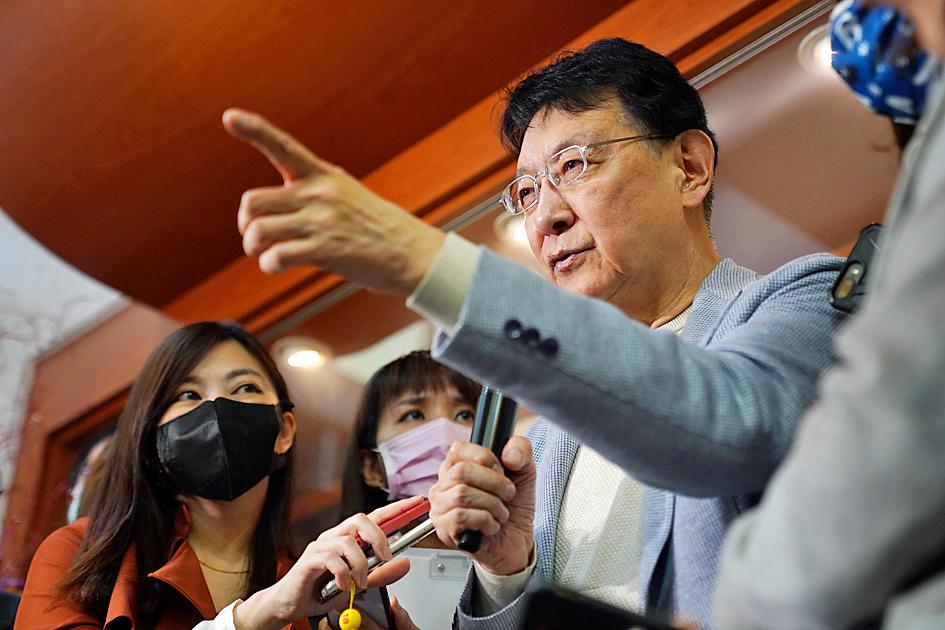Media personality and Broadcasting Corp of China (中廣) chairman Jaw Shaw-kong (趙少康) yesterday said he would seek the Chinese Nationalist Party’s (KMT) nomination to run in the 2024 presidential election.
Jaw, a former lawmaker who in 1993 left the KMT with several other members to form the New Party, on Monday last week said that he had submitted a request to restore his KMT membership, and that he would not rule out entering this year’s race for KMT chairperson.
Jaw said he was also open to making a bid for city mayor or county commissioner in next year’s local elections, or appearing on the ticket in the 2024 presidential election.

Photo: CNA
He said that former Kaohsiung mayor Han Kuo-yu (韓國瑜), who was the KMT presidential candidate in last year’s election, at a meeting in September last year urged him to run for KMT chairman.
Asked by reporters in Taipei whether the early announcement of his interest in running in the KMT presidential primary was aimed at blocking a possible bid by former KMT chairman Eric Chu (朱立倫), Jaw said: “No one can block anyone... [Chu] will still run if he wants to.”
Chu, a former New Taipei City mayor, represented the KMT in the 2016 presidential election, which he lost to then-Democratic Progressive Party (DPP) candidate President Tsai Ing-wen (蔡英文).
He is also widely seen as a potential candidate for KMT chairman.
Asked whether he had discussed his decision with former president Ma Ying-jeou (馬英九) of the KMT, Jaw said: “I did not discuss it with anyone.”
Jaw said he felt the Tsai administration was not doing a good job.
“I think I have a chance, and I think I have a lot of ideas to make Taiwan better, to make Taiwan greater,” he said.
Asked whether he would consider being a vice presidential candidate, Jaw said: “Probably not.”
KMT Chairman Johnny Chiang (江啟臣) in a statement on Wednesday last week said that Jaw’s request to return to the KMT had been approved.
Jaw would be appointed to the KMT’s Central Advisory Committee after the Lunar New Year holiday, Chiang said.
According to KMT regulations, a party member must have served in the Central Advisory Committee or Central Standing Committee to run in the chairperson election.
Additional reporting by CNA

CHAOS: Iranians took to the streets playing celebratory music after reports of Khamenei’s death on Saturday, while mourners also gathered in Tehran yesterday Iranian Supreme Leader Ayatollah Ali Khamenei was killed in a major attack on Iran launched by Israel and the US, throwing the future of the Islamic republic into doubt and raising the risk of regional instability. Iranian state television and the state-run IRNA news agency announced the 86-year-old’s death early yesterday. US President Donald Trump said it gave Iranians their “greatest chance” to “take back” their country. The announcements came after a joint US and Israeli aerial bombardment that targeted Iranian military and governmental sites. Trump said the “heavy and pinpoint bombing” would continue through the week or as long

TRUST: The KMT said it respected the US’ timing and considerations, and hoped it would continue to honor its commitments to helping Taiwan bolster its defenses and deterrence US President Donald Trump is delaying a multibillion-dollar arms sale to Taiwan to ensure his visit to Beijing is successful, a New York Times report said. The weapons sales package has stalled in the US Department of State, the report said, citing US officials it did not identify. The White House has told agencies not to push forward ahead of Trump’s meeting with Chinese President Xi Jinping (習近平), it said. The two last month held a phone call to discuss trade and geopolitical flashpoints ahead of the summit. Xi raised the Taiwan issue and urged the US to handle arms sales to

State-run CPC Corp, Taiwan (CPC, 台灣中油) yesterday said that it had confirmed on Saturday night with its liquefied natural gas (LNG) and crude oil suppliers that shipments are proceeding as scheduled and that domestic supplies remain unaffected. The CPC yesterday announced the gasoline and diesel prices will rise by NT$0.2 and NT$0.4 per liter, respectively, starting Monday, citing Middle East tensions and blizzards in the eastern United States. CPC also iterated it has been reducing the proportion of crude oil imports from the Middle East and diversifying its supply sources in the past few years in response to geopolitical risks, expanding

Pro-democracy media tycoon Jimmy Lai’s (黎智英) fraud conviction and prison sentence were yesterday overturned by a Hong Kong court, in a surprise legal decision that comes soon after Lai was jailed for 20 years on a separate national security charge. Judges Jeremy Poon (潘兆初), Anthea Pang (彭寶琴) and Derek Pang (彭偉昌) said in the judgement that they allowed the appeal from Lai, and another defendant in the case, to proceed, as a lower court judge had “erred.” “The Court of Appeal gave them leave to appeal against their conviction, allowed their appeals, quashed the convictions and set aside the sentences,” the judges